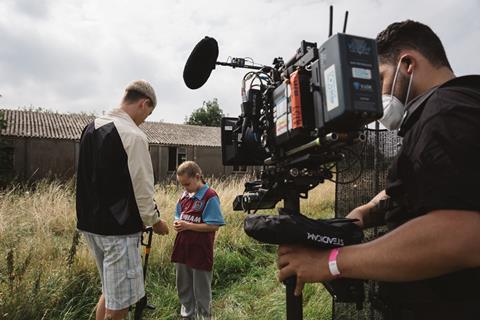Friends and collaborators, the directors of Scrapper and How To Have Sex discuss working with young actors and the joy of brutal audience reactions.

Charlotte Regan and Molly Manning Walker have written and directed two of the most talked-about debut UK features of the year, How To Have Sex and Scrapper. They are also friends and collaborators — Manning Walker was the director of photography for Regan’s Scrapper.
The latter feature is a comedy drama starring newcomer Lola Campbell as Georgie, a 12-year-old living on her own and fooling the authorities after losing her mother, with Alin Uzun as her friend Ali. She has to face reality in a new way when Lola’s estranged father Jason (Harris Dickinson) comes back into her life. Scrapper won the grand jury prize in Sundance’s world cinema dramatic competition. Theo Barrowclough produced, with backing from BBC Film, the BFI Film Fund and Great Point Media. Picturehouse Entertainment released in the UK, grossing $734,000 (£578,000), with Kino Lorber handling the US release.
Manning Walker’s How To Have Sex follows three British teenage girls on a rites-of-passage summer holiday, drinking, clubbing and hooking up; it explores the complexities of consent and social pressures even within a friendship group. The young ensemble cast includes Mia McKenna-Bruce, Lara Peake, Samuel Bottomley, Shaun Thomas, Enva Lewis and Laura Ambler.
Producers are Ivana MacKinnon, Emily Leo and Konstantinos Kontovrakis and the film shot in Malia, Crete with backing from Film4, BFI Film Fund and mk2 Films. How To Have Sex premiered in Cannes where it won the Un Certain Regard prize. Mubi released in the US and UK, grossing $475,0000 (£377,000) at press time in the latter market.
Both films won prizes at the British Independent Film Awards, with How To Have Sex’s McKenna-Bruce winning best lead performance, Thomas sharing best supporting performance and Isabella Odoffin winning best casting; and Scrapper producer Barrowclough winning breakthrough producer.
The directors sat down with Screen International to talk about their filmmaking processes and how their friendship has helped the filmmaking journey.
Screen: You obviously know each other very well and have worked together — do you see similarities in How To Have Sex and Scrapper at all, or do they feel completely different?
Molly Manning Walker: There’s a naturalism to both — but I don’t think there are that many similarities storywise.
Charlotte Regan: Maybe there is more in common with performance. We both get similar performances out of people because we quite like letting people just exist in a space.
You worked with two extraordinary young performers, Mia McKenna-Bruce and Lola Campbell. How did you cast them and work with them?
Manning Walker: Mia did an amazing tape very early on, but my anxiety was she was 25 at the time and would need to play 16. We did these workshops around the UK and realised that 16-year-olds look mad old — some of them look older than I do now [laughs]. Mia was fun and bubbly but had something else going on underneath, and that’s what the whole film is about — what you present to the world and what you are existing as underneath. She was screen testing with other people for five months and during that time we figured out what the role was.
Charlotte, how did you work with Lola?

Regan: Lola’s first take would be the best take and I’d slowly ruin it, and I’d think, “Why am I even here?” [laughs]. If I just gave Lola control, the film would be much better. Lola sent in an amazing tape talking about all the shopping she did at Home Bargains, a discount store. But then we did an in-person audition, and she wouldn’t really speak or look me in the eye — she froze. So Theo [Barrowclough, producer] and I started going to her house two times a week for four months, and just having cups of tea and messing around.
How did Lola adapt to the shoot?
Regan: She switched it on! On the first day she was fine. She had been saying to me and Theo and Molly, “Don’t worry, I’ll do it on the day, guys.” And she did. Molly and I had more anxiety on the shoot than she did!
It’s an intimate relationship between the DoP and actors so, Molly, what sort of responsibility did you feel on Scrapper — especially with the young actors?
Manning Walker: You do feel a huge responsibility. We’ve been on terrible sets and know how affecting they are as adults. So for kids, it’s already overwhelming and confusing. We tried to create a kid-friendly atmosphere, friendly and playful.
Regan: Molly was one of the only people who could get Lola to smile — because Lola hates smiling. The way she did that was to flip a middle finger behind the camera [laughs].
Charlotte, was it reassuring your DoP was also about to make her own debut feature as a director?
Regan: Molly, you can leave the room because it makes her uncomfortable when I say nice things about her! [Molly leaves briefly.] We always said we’re in such a lucky position, I love Molly beyond filmmaking. [Molly yells from the other room: “Shut up!”] I could show vulnerability because of that. We have shared a similar journey. Even now, I can tell her what’s going on and she will say, “This is happening to me as well. I feel it too.” It makes you feel much less alone. It’s also inspiring to see someone you love so much do so well.
Manning Walker: I couldn’t have done it without Charlotte as well. You go through this process and it’s so alien, and I learned so much from being the DoP on Scrapper, like how to run a set and how to be a legend in creating an atmosphere where everyone wants to work. In the aftermath of putting the film out into the world with festivals and press, it’s great to have my friend with me who is not mad competitive.
How did you two actually meet? Was it long before Scrapper?
Manning Walker: We shot an advert for Gumtree together in early 2020, just as Covid hit.
Regan: It was a trippy, fun shoot in Wales. I’d be grafting all night, and Molly would say, “Oh yeah, I’m just going to go swimming.”
Manning Walker: She was preparing in her room while the rest of us were having dinner… It was a stressful shoot because there was a huge storm. We couldn’t use Steadicam because of the winds. But it wasn’t stressful for Charlotte because she’d been preparing all night. After that, we became friends and we used to go on three-hour dog walks and drink hot chocolate. We did that for a year and she never mentioned Scrapper once.
Regan: You’ve got to be friends before you talk about the film. We’d just talk about happiness and stuff. That is the central foundation to the DoP-director relationship.

Is it annoying that people try to lump you together by talking about a new generation of British directors?
Regan: It’s quite a cool and mad year for British debuts in particular. There is risk-taking in them. I like being lumped together with that group.
Manning Walker: It feels like a radical moment that there are so many cool new voices coming through. It’s good and exciting to be a part of that.
Does the industry ever try to make you out as competitors?
Regan: Maybe some people encourage that, but we probably don’t notice it. You’re allowed more than one female filmmaker in the world. We’ve moved on. There’s enough space in the world for different filmmakers, we have such different stories to tell. Whenever Molly does well, I feel just as excited as when I do well. I was crying at Cannes when she was crying. Unless Molly secretly hates me.
Manning Walker: The industry breeds this idea for people to be against each other — it’s nice to reject that and support each other. There’s so much room for people to coexist.
Do you each have a favourite part of the filmmaking process — writing, shooting, post?
Manning Walker: The shoot.
Regan The shoot.
Manning Walker: The shoot is when you make this new family and have all these people to get energy from. The possibilities feel endless. One thing I loved working on Scrapper was that if something wasn’t working, Charlotte was really good about switching it up. You’re thinking on your feet and being reactive to those moments. I learned that from Charlotte.
Regan: I love all the people. And when problems have to be solved instantly. In prep, there are endless conversations. Problem-solving instantly suits both of us. We both complain about post. I was down the road working on post from Molly, and we’d meet up for lunch and go on walks of despair [laughs].
Molly, what were some of your challenges in post?
Manning Walker: Our editor [Fin Oates] was on set, which was amazing in some ways, because we were very reactive to what we were getting. But she almost knew too much — it could be hard to break out of the world that we were living in. Sometimes you need that disconnect. We had a crazy schedule in post, we did two weeks of ADR. It was hectic.
Both your films treat young people seriously and authentically. How did you approach depicting youth in a way that’s not talking down about them — or to them?
Manning Walker: In our heads, we’re probably closer to their ages — well, maybe not 11! I think it comes from memory and reflecting on those times but also trying to keep it playful and allowing them to bring themselves — they know that world closer than we do. It was a playful, improvised set.
Regan: We are big fans of letting the people making the film take ownership of the project. I’m not saying, “I’m an auteur and everything I say goes.” It was asking, “Lola, Alin, what do you think feels good for this?” And — as Molly says — we are like massive children. After making Scrapper, we took Lola to Legoland, and I think it was because Molly and I wanted to go to Legoland — Lola wasn’t that bothered [laughs].
If you each look back on making your debut feature and how you thought it would go, did anything surprise you in the process?
Manning Walker: I was always surprised that someone gave us money. Even until week two of the shoot, I thought, “It’s going to get shut down.”
Regan: In the edit it felt like I was in The Lord Of The Rings trilogy, it was so long it was incredible. I guess I found it weird that you have no idea if the film is a total piece of shit or not. The strangest part was letting go and just letting the world decide — that was the scariest part I didn’t see coming.
Manning Walker: It’s a weird thing to say, but I didn’t think about people watching the film. I did know people would watch it, but in hindsight I didn’t think about the scale of that.
How has it been hearing from audiences? It’s not just your film anymore once it’s at festivals and in cinemas.
Regan: This is the part of it that I talk to Molly most about, because other people take ownership of the film in a great way but some people say, “This is what it means.” I just have to think, “That’s cool if that’s what you found within it.” With Scrapper, my mum and I read all the half-star and one-star Letterboxd reviews — they are the only ones we read, the brutal ones. Just for joy, for how passionate these people are in their hate. They will say things like, “I love Harris [Dickinson] but I hate this film” [laughs]. With How To Have Sex I only read the five-star Letterboxd reviews.
Manning Walker: My half-star reviews complain: “This wasn’t a tutorial on how to have sex.”
What are you each working on now? Do your next projects feel related to your debut films?
Regan: I am working on a TV drama in Liverpool [BBC’s The Responder]. It’s fun, I love being on set and don’t want to fall out of that habit. Otherwise, I’m writing a second film and watching basketball games. And I want to get a Staffy [dog] and name it Dorito. Molly wants to have a Staffy too.
Manning Walker: I guess the lesson from Scrapper and How To Have Sex is that I want to work with great people and the right collaborators in whatever form that is. And maybe we can shoot a music video together one day again, and it can star the Staffy.






![The Brightest SunScreen[Courtesy HKIFF]](https://d1nslcd7m2225b.cloudfront.net/Pictures/274x183/3/5/0/1448350_thebrightestsunscreencourtesyhkiff_312678.jpg)


















No comments yet